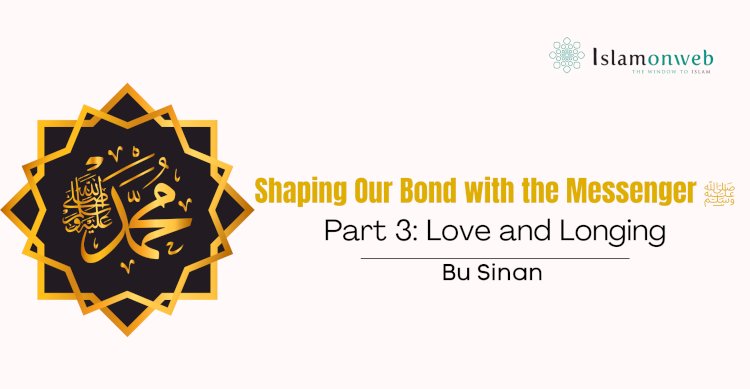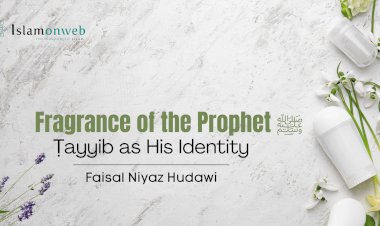Shaping Our Bond with the Messenger ﷺ – Part 3: Love and Longing
Shaping Our Bond with the Messenger ﷺ – Part 1: Faith and Obedience
Shaping Our Bond with the Messenger ﷺ Part 2: Reverence and Honour
Faith is not complete until the heart overflows with love for the Messenger of Allah ﷺ. This love is not a secondary matter—it is the very essence of īmān, the sweetness that brings life to worship and meaning to sacrifice.
Allah ﷻ warns us with a decisive verse:
“Say: If your fathers, your sons, your brothers, your spouses, your relatives, the wealth you have acquired, the commerce you fear will decline, and the dwellings you delight in are dearer to you than Allah and His Messenger and striving in His cause, then wait until Allah brings His command.” (al-Tawbah 9:24)
Love for the Prophet ﷺ must be greater than love for family, wealth, comfort, or even one’s own soul. Without this love, faith itself is in danger.
The Sweetness of Faith
The Prophet ﷺ said:
“There are three qualities, whoever has them will taste the sweetness of faith: that Allah and His Messenger are more beloved to him than anything else...” (Bukhārī, Muslim)
He ﷺ also declared:
“None of you truly believes until I am more beloved to him than his father, his child, and all of mankind.” (Bukhārī, Muslim)
Loving the Prophet ﷺ is not something optional, rather it is the condition of true belief and a sign of it.
ʿUmar ibn al-Khaṭṭāb رضي الله عنه once confessed to the Prophet ﷺ: “You are more beloved to me than everything except myself.” The Prophet ﷺ replied: “No, O ʿUmar, not until I am more beloved to you than your very self.” ʿUmar then said: “By the One who revealed the Book to you, you are now more beloved to me than myself.” The Prophet ﷺ answered: “Now, O ʿUmar.” (Aḥmad)
This dialogue shows how love for the Messenger ﷺ must surpass even the instinct of self-preservation.
With the One We Love
Love is also the key to companionship in the Hereafter. A man once asked the Prophet ﷺ about the Hour. The Prophet ﷺ asked: “What have you prepared for it?” The man replied: “I have not prepared much prayer, fasting, or charity, but I love Allah and His Messenger.” The Prophet ﷺ responded:
“You will be with those whom you love.” (Bukhārī, Muslim)
Anas رضي الله عنه said, reflecting on this narration: “We were never happier about anything after Islam than when the Prophet ﷺ said: ‘You will be with those you love.’ For I love the Messenger of Allah, Abū Bakr, and ʿUmar, and I hope to be with them by my love for them, even if my deeds fall short of theirs.”
The Prophet ﷺ also promised:
“Whoever loves me will be with me in Paradise.” (Aṣbahānī, al-Targhīb)
What greater glad tidings than to know that love alone can secure the company of the Beloved ﷺ in the Gardens of Eternity?
Love that Burns with Longing
The Companions’ love was marked by longing that could not be contained. A man once came to the Prophet ﷺ and said: “O Messenger of Allah, you are more beloved to me than my family and my wealth. I remember you and I cannot bear to wait until I come to see you. Then I remembered my death and your death, and I knew that when you enter Paradise you will be raised among the Prophets, while if I enter it, I will not be able to see you.”
Allah then revealed:
“Whoever obeys Allah and the Messenger, they will be with those Allah has blessed—the Prophets, the truthful, the martyrs, and the righteous. And what an excellent company they are.” (al-Nisāʾ 4:69)
Thus, the Qur’an itself assured him that love and obedience would grant him nearness to the Messenger ﷺ in the Hereafter.
The Prophet ﷺ gave glad tidings even to those who never saw him but longed for him:
“Among the most beloved of my Ummah to me are those who will come after me, who would give their families and wealth just to see me.” (Muslim)
This ḥadīth speaks to us, Muslims of later generations. Our yearning for him, our sending of ṣalawāt, our tears at his remembrance, these are signs of a love that brings us closest to him, despite the distance of centuries.
The righteous after the Companions emphasised this love as the axis of faith. Sahl al-Tustarī رحمه الله said: “Whoever does not see himself under the guardianship of the Messenger ﷺ in all his affairs, and does not see himself as belonging to him, will not taste the sweetness of his Sunnah.” He cited the ḥadīth: “None of you truly believes until I am more beloved to him than his own self.”
Love, therefore, is not a sentiment alone; it is belonging, loyalty, and surrender of the heart.
The Signs of True Love
Love for the Messenger of Allah ﷺ was not only spoken on the tongues of the Companions; it was seen in their choices, their sacrifices, and their priorities. Their joy was not in worldly gain, but in whatever pleased the Prophet ﷺ.
Ibn ʿUmar رضي الله عنه narrated that Abū Bakr once said to the Prophet ﷺ: “By the One Who sent you with the truth, the Islam of Abū Ṭālib would have been more pleasing to my eyes than the Islam of my father Abū Quḥāfah—because your joy would have been greater.” (Ibn ʿAsākir)
His own father’s salvation meant less to him than the happiness of the Messenger ﷺ. Such was the measure of his love.
ʿUmar ibn al-Khaṭṭāb رضي الله عنه likewise said to al-ʿAbbās, the Prophet’s uncle: “Your accepting Islam is more beloved to me than if my father al-Khaṭṭāb had accepted Islam—because that is more beloved to the Messenger of Allah ﷺ.” (Bayhaqī, Bazār)
The Companions’ hearts were bound so deeply to him ﷺ that what pleased him pleased them, and what saddened him saddened them.
One of the most moving examples is that of a woman from the Anṣār, whose father, husband, and brother were all martyred in the Battle of Uḥud. When she was told, she did not weep or ask about them. Instead, her first words were: “What happened to the Messenger of Allah ﷺ?” They assured her that he was well. She said: “Show him to me.” When her eyes fell upon him, alive and safe, she said: “Every calamity after you is insignificant.” (Ibn Isḥāq, Bayhaqī)
Her entire world could collapse, but her love for the Prophet ﷺ made everything else bearable as long as he was safe.
Love Shown Through Following Him
Al-Qāḍī ʿIyāḍ رحمه الله explained: “One of the signs of love for the Messenger ﷺ is preferring his love over one’s own desires. Whoever claims to love him but does not follow him is only a pretender. The truthful in love are those whose lives show its marks: imitating his actions, obeying his commands, avoiding his prohibitions, and adorning themselves with his noble manners in ease and hardship, in joy and sorrow.”
This is confirmed by the divine command:
“Say: If you truly love Allah, then follow me; Allah will love you and forgive you your sins.” (Āl ʿImrān 3:31)
Thus, true love is not measured by words alone, but by placing his Sunnah above the pull of our egos and the habits of our culture.
The Prophet ﷺ said to Anas رضي الله عنه:
“My son, if you can go to sleep and wake up without any deceit in your heart towards anyone, then do so. This is part of my Sunnah, and whoever revives my Sunnah loves me, and whoever loves me will be with me in Paradise.” (Tirmidhī)
Here, the Prophet ﷺ showed that love is not an abstract claim; rather, it is lived out in purity of heart, sincerity of action, and faithfulness to his Sunnah.
One of the clearest signs of love is frequent remembrance. As the saying goes, “Whoever loves something, mentions it often.” The heart that overflows with his love finds comfort in repeating his name, sending ṣalawāt upon him, and recalling his example.
Another sign is longing to meet him. Every lover yearns for the presence of the beloved. This extends to loving whatever is loved by the Prophet ﷺ and imitating him in everything possible. Anas ibn Mālik رضي الله عنه narrated that when he once saw the Prophet ﷺ picking pieces of pumpkin (dubbāʾ) from around a dish, he said: “From that day on, I loved pumpkin.” (Bukhārī, Muslim)
This simple moment of observation left a lasting imprint of love.
Similarly, al-Ḥasan ibn ʿAlī, Ibn ʿAbbās, and Ibn Jaʿfar once asked Salmā—the servant of the Prophet’s aunt Ṣafiyyah—to prepare for them the foods that the Messenger of Allah ﷺ loved. Ibn ʿUmar رضي الله عنه used to wear sibtiyyah sandals and dye his garment with saffron, following the Prophet’s ﷺ practice. Love naturally seeks to imitate, to live in the traces of the beloved.
Another sign of love is detesting those who oppose him. Allah ﷻ says:
“You will not find a people who believe in Allah and the Last Day having affection for those who oppose Allah and His Messenger…” (al-Mujādilah 58:22)
The Companions lived this principle even when it tested the deepest ties of family. They fought their own fathers, sons, and relatives on the battlefield if they opposed the Messenger ﷺ. ʿAbdullāh ibn ʿAbdullāh ibn Ubayy once said to the Prophet ﷺ regarding his father, the chief hypocrite: “O Messenger of Allah, if you command me, I will bring you his head.” (Bukhārī)
Such was the firmness of their loyalty, the love of the Prophet ﷺ outweighed the strongest bonds of blood when those bonds conflicted with faith.
Whoever truly loves the Messenger of Allah ﷺ finds their love lifting them above worldly concerns. They love what he loved and turn away from what he disliked. Their manners soften in imitation of his gentleness, their patience strengthens in the shadow of his endurance, and their longing for the Hereafter deepens—because it is the only place where they can once again behold his noble face.
This love accompanies a believer to the very end of life. When Bilāl ibn Rabāḥ رضي الله عنه, the beloved mu’adhdhin of the Prophet ﷺ, lay on his deathbed, his wife wept, saying: “Oh, what sorrow!” But Bilāl, his eyes bright with longing, replied: “Rather, what joy! Tomorrow I will meet the beloved ones, Muḥammad and his Companions.”
The anticipation of reunion with the Messenger ﷺ lifted his final moments. Such is the sweetness of a heart consumed by love.
The poets of this Ummah, too, poured their yearning into verse, keeping the flame of love alive across generations. One of them said:
أيا مولد المختار جدّدت شوقنا
إلى خير مبعوث جليل حوى الفضلا
“O birth of the Chosen One, you renew our longing,
for the best of those sent, the noble who encompassed all virtue.”
This is the fragrance of love that transcends time; each remembrance of him rekindles longing, each mention of his name softens the heart.
Those who embody these qualities possess complete love for Allah and His Messenger ﷺ. As al-Qāḍī ʿIyāḍ noted, whoever falls short in some traits has a diminished share, yet remains under the blessed name of love and its protection. For in the end, the Messenger of Allah ﷺ himself promised:
“A person will be with those he loves.” (Bukhārī, Muslim)
What more could the lover of the Prophet ﷺ desire than this?
This article is prepared primarily based on excerpts from Subul al-Hudā wa al-Rashād fī Sīrat Khayr al-ʿIbād, vol. 11, authored by Muḥammad ibn Yūsuf al-Ṣāliḥī al-Shāmī (d. 942 AH).
Disclaimer
The views expressed in this article are the author’s own and do not necessarily mirror Islamonweb’s editorial stance.
























Leave A Comment